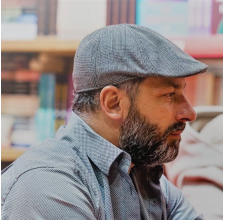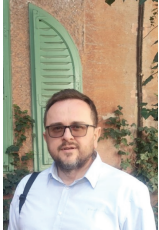Zan Mitrev, a top specialist in the field of cardiovascular surgery, was born on January 11, 1961, in Stip, Yugoslavia, now Republic of North Macedonia. Through the years, many surgeries, many successes, many awards, many participations in world- renowned scientific gatherings followed. As a result of that, as early as in 2002, his significant role in the development of healthcare was recognized, and he was accepted for a member of the Plato Academy. With all novelties he introduced in the system of the Macedonian healthcare, he became a promoter of the progress of medicine not only professionally, but also organizationally. The Academician has participated in many scientific and professional events around the world. He is an active member of many international professional associations. With his characteristics of a great expert, a humanist and a visionary in the field of medicine, on January 17, 2018 Dr. Zan Mitrev became a worthy member of the European Academy of Sciences, Arts and Literature. His main goal and mission is to develop humanism and through the development of medicine to contribute for his people and the humanity. He is also President of the Scientific Committee of Academia Balkanica Europeana.
“The greatest danger in times of turbulence is not the turbulence. It’s to act with yesterday’s logic.” Peter Drucker
The pandemic has irreversibly changed the way we perceive life and our daily priorities. Will we ever go back to our former way of life and the plans we had for the future? It is only natural for us to be haunted by these existential issues, because we are all human beings and as such, we witness reactions to the pandemic on several levels simultaneously: globally, nationally, locally, but also on a personal level within our collective or family.
If we recall Albert Camus’ “The Plague”, published in 1947, in which he talks about living in isolation during the plague epidemic, I am positive that this aspect of existentialism will now take on a completely different meaning. The role of the doctor in this piece constantly shows that they are playing their role, as an excuse for their actions. However, from today’s perspective, this offers another opportunity, which is not to justify their actions, but to set the basis for being authentic in playing their own role.
I am not just a doctor, I am also the owner of a hospital, I am a leader. My role is manifold and requires the inevitable unification and use of different skills.
From this perspective, we all must agree that the role of a leader includes everyone in a certain way.
When talking about business leaders, their role has dramatically changed in the past few months. Prior to Corona, Executive Directors and the rest of the Managers focused on adopting innovations, increasing sales, and conquering larger market shares.
Nowadays most of them have to make rapid decisions in order to be able to control the costs and maintain financial liquidity. They are hard pressed to overcome previously non-existent obstacles such as changes in the supply chain, decimation of their teams and operational challenges that drastically alter the focus of priorities. At the same time, together with their employees, they face health and safety concerns, work from home, but also have to provide support for their families in times of a pandemic. This is not a simple transition, a shift from one role to another, but we utilize all our work experience to apply some of the principles that are practiced in cardiovascular surgery, and those are making rapid decisions.
It is well known that true leadership does not come to the fore when “the ship sails in calm waters”, it is quite the contrary. It is during hard times when the “hero” within us is revealed. There is no user manual to be applied in times of crisis because each one comes with unique characteristics and requires a different approach from previous crisis. There is no time for prior preparations.
But what does not change is that the people on the team expect calmness and confidence from their leader. Panic is easily spread, so you must control the situation. You must not react emotionally, but deliberately.
In times of crisis, nothing is more important than caring for your employees. You need to put yourself in their shoes. People need someone to rely on and not someone that requires comforting. You also have to remain positive and realistic. The line of balance is very thin, and the chaos needs to be kept under control. This includes quick delegation of tasks, as everyone needs to be involved.
A quick risk assessment must also be conducted, and a decision made about which next steps should be taken.
Clear and detailed communication is essential. Everyone should be informed about the new goals and next steps.
Sounds impossible? It is not.
The Chinese word for “crisis” contains two signs, one denoting danger and the other opportunity.
One must stay positive, and this is really one of the things that are easier to be said than to be done. I am not talking about blind optimism here, but simply about keeping in mind that each crisis will pass. We should not avoid or ignore it; we should simply use it as a springboard for further change. Crisis is always an opportunity to take responsibility and do better.







